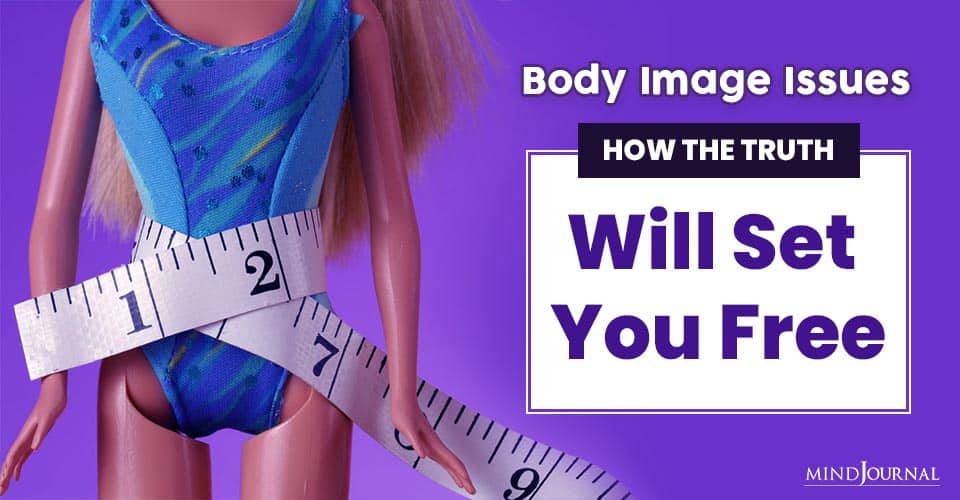I always encourage my clients to be truth-seekers, both because the truth will set us free, and because body image issues always point us toward a complex web of untruths.
Granted, we all lie to ourselves all the time in many areas of life. This is nothing new.
We come up with stories to explain things out of thin air, sometimes even spending years or decades believing the stories we make up. Some of those lies are simple, like when someone doesn’t text us back for a while, and we decide they must be mad at us.
Other lies are complicated and massively impactful, like the ones we tell ourselves about our worth, body, appearance, and weight.
Those lies tend to be deep, dark, sticky, and old, both because they begin at such a young age, and because the personal and painful nature of the human condition skews us all toward feeling alone, wrong, bad, and broken.
Those stories also tend to be held up by the deeply ingrained conditioning of sexism, super-distinct binary gender roles/expectations, ableism, racism, and fatphobia that gets reinforced everywhere we look.
Perhaps you recognize some of these stories?
- A woman is only worthy of love and acceptance if she’s thin, toned, feminine, and conventionally beautiful.
- We must control our appetites and our bodies or they’ll get completely out of control.
- Losing weight is the key to happiness.
- If I fix all my flaws and look “perfect” I can avoid vulnerability and stay safe.
Why you should seek truth?
Truth-seeking (or truth-hunting, as I sometimes call it) is the process of identifying the specific and unique lies embedded in your unconscious mind, and either clearing them out or simply refusing to live life in accordance with them anymore.
The first big lie I believed about my body started at seven years old, when a teenage boy convinced me to “play a game.” The lesson I learned that day (and many times after) was that something about me invited boys and men to want me, and them wanting me was more important that me not wanting them.
It took me twenty years to discover that this story was a lie. Twenty years to discover that my value isn’t linked to being wanted, and that I don’t owe anybody anything.
It took me twenty years to discover that my wanting (and not wanting) mattered more than anyone else’s.

But this is how it is, to be human. Our minds are wired to make up stories. My story made sense to me at the time, and it helped me make sense of the world as I experienced it. But when I started naming and questioning these unconscious stories on my healing journey, I was pretty shocked to discover that, among other lies, I believed:
- I am responsible for everyone else’s behaviors.
- Men can tell I’m the kind of person you violate.
- If I look perfect, and give men exactly what they want, I will be safe.
Don’t get me wrong, my conscious mind rejected all of those stories immediately. I was a badass, outspoken feminist. Consciously, I knew this was all complete bullshit. But despite that, my unconscious mind treated those stories like gospel.
Related: 21 Things That Change When You Start Respecting Yourself
This is where the truth-hunting began. If looking perfect won’t keep me safe, what’s the Truth? The truth will set us free.
The truth is that being a human is inherently unsafe, that bad things happen, and that the world is scary and painful, sometimes. The truth is that my body can’t keep me safe no matter how I look, and other people’s actions are neither my fault nor my responsibility.
That Truth was heavy… but it had the power to set me free.
Because the other part of that Truth was realizing that I am also strong enough to handle living, and being fully present, in a world which is scary and painful sometimes. The truth is that I don’t need make-believe to shield me from that reality anymore.
We all have lies about our bodies and worth.
They are often very convincing lies, given our life experiences. They are sometimes beautiful lies, tempting lies, because if our bodies are the problem, then we stand a chance of fixing it.
These are lies that have often protected us from some terrifying and painful prospects. It’s much easier to believe it was our body’s fault than to believe someone we loved would hurt us, after all. It’s much easier to believe the only thing standing between us and the life we desire is thirty pounds or a facelift, than to face the reality that maybe that life just isn’t in the cards for us.
Related: 8 Ways To Cultivate Resilience In Yourself During Tough Times
I had a client recently realize she’d spent her entire adult life hating her body because she believed if only she could achieve a “perfect body,” then nobody would ever be able to hurt or leave her again.
It’s no wonder that, when we give our bodies a completely impossible job– like looking perfect enough to keep us safe, score us a life partner, or make us happy– we end up hating and resenting them for being what they are.
Sometimes it’s easier to blame your body for causing pain and rejection (or failing to earn you love or belonging) than to face what it would mean if, in fact, life is just painful, lonely, and scary sometimes.
Related: Top 11 Ways To Step Out of Your Comfort Zone And Get Unstuck
But the truth will set us free.
Because when you go digging through the lies in your own unconscious mind, you will undoubtedly come across some truth that terrifies you… until you learn the even-deeper truth that you are strong enough to face and handle all of it.
If you struggle with body image, I encourage you to become a truth seeker. It’s hard, scary work sometimes, but on the other side of truth seeking is freedom. And, as Glennon Doyle says,
“we can do hard things.”
Besides, it’s not like hating your body is such a walk in the park. In fact, it’s incredibly fucking painful and lonely and difficult, as you probably already know. So since you’re already doing hard and scary things, you may as well do them in service of Truth, right?
At least that’s how I see it. And that’s how I help my clients see it too, because we are all strong enough to handle it, and because we all deserve to be free.
What do you think?
Written by: Jessi Kneeland
Originally appeared on: Jessikneeland.com










Leave a Reply